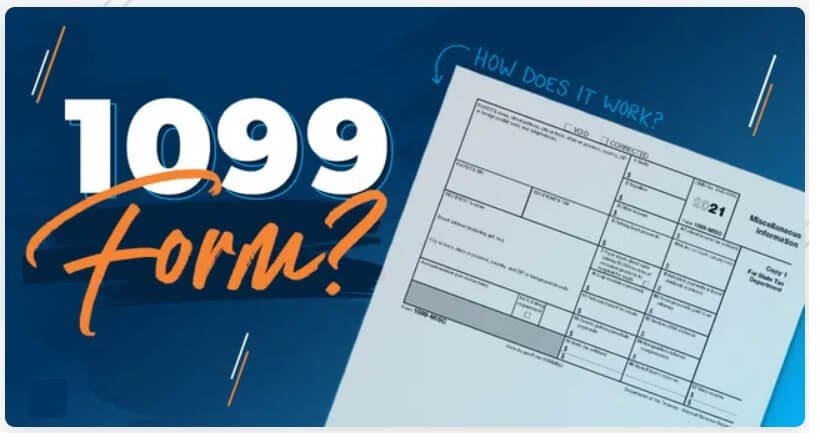Introduction
When it comes to tax reporting, one form that holds significant importance is the IRS Form 1099. In this guide, we will delve into the details of Form 1099, its purpose, and why it matters to both taxpayers and businesses.
- Different Types of IRS Form 1099 IRS Form 1099 comes in various categories, each representing a specific type of income. Let’s explore some of the common types:
IRS Form 1099-MISC: Miscellaneous Income Form 1099-MISC is used to report income earned as an independent contractor or freelancer. It covers various types of payments, such as non-employee compensation, rent, royalties, and more.
IRS Form 1099-INT: Interest Income If you received interest income from a bank account, investment, or other sources, you’ll likely receive Form 1099-INT. It reports the interest earned throughout the year.
IRS Form 1099-DIV: Dividend Income Form 1099-DIV is issued by financial institutions to report dividends and distributions received from stocks, mutual funds, or other investment accounts.
IRS Form 1099-B: Proceeds from Broker and Barter Exchange Transactions If you engaged in stock trading, sold securities, or participated in barter exchanges, you may receive Form 1099-B. It reports the proceeds from these transactions.
IRS Form 1099-K: Payment Card and Third-Party Network Transactions Form 1099-K is used by payment processors and third-party networks to report payment transactions processed on behalf of businesses or individuals.
IRS Form 1099-R: Distributions from Retirement Accounts If you received distributions from retirement accounts, such as pensions, annuities, or individual retirement accounts (IRAs), you’ll receive Form 1099-R.
- Who Needs to File IRS Form 1099 Understanding your filing obligations is crucial to avoid penalties. Here are some key points to consider:
- Obligations for businesses and self-employed individuals: Businesses and self-employed individuals must issue Form 1099 to report payments made to contractors, freelancers, and other service providers. Additionally, financial institutions and payment processors have their own filing requirements.
- Threshold requirements for filing IRS Form 1099: Generally, if you paid $600 or more in a calendar year to an individual or unincorporated business for services rendered, you are required to file Form 1099. However, some types of payments may have different thresholds.
- Exceptions and special cases: Certain payments are exempt from Form 1099 reporting, such as payments made to corporations, payments for merchandise, and payments made via credit card or third-party networks.
III. Reporting and Filing Requirements To stay compliant, it’s important to understand the reporting and filing requirements associated with IRS Form 1099.
- Deadlines for filing IRS Form 1099: Form 1099 must be provided to recipients by January 31st of the following year, and the copies must be submitted to the IRS by February 28th (or March 31st for e-filing).
- Methods for filing IRS Form 1099: You can file Form 1099 by mail or electronically using the IRS’s online platform or authorized e-file providers.
- Electronic filing options: The IRS encourages electronic filing and offers various options, including fillable forms and specialized software, to facilitate accurate and efficient reporting.
- Penalties for non-compliance or late filing: Failing to file Form 1099 or submitting incorrect information can lead to penalties. The penalties vary depending on the time of correction and the number of forms involved.
- How to Complete IRS Form 1099 Properly completing Form 1099 is crucial to ensure accurate reporting. Here’s a step-by-step guide:
- Step-by-step instructions for filling out the form: Carefully follow the instructions provided with each specific type of Form 1099. It will guide you through each section and help you provide accurate information.
- Required information and data to include: Some common information required on Form 1099 includes the recipient’s name, address, taxpayer identification number (TIN), payment amounts, and any federal tax withheld.
- Tips for accurate and error-free completion: Double-check all the information entered on the form to avoid mistakes. Ensure the recipient’s TIN is accurate by requesting a completed Form W-9 from the payee.
- Recipient’s Perspective As a recipient of Form 1099, understanding how to handle it correctly is essential. Here’s what you need to know:
- Receiving IRS Form 1099: What to do as a recipient: When you receive Form 1099, review it carefully to ensure accuracy. Compare the information provided with your records to spot any discrepancies.
- Understanding the information provided on the form: The form will detail the type and amount of income you received. Use this information when preparing your personal tax return.
- Reporting IRS Form 1099 income on personal tax returns: Include the income reported on Form 1099 when filing your tax return. Use the information provided to report the income in the appropriate sections or schedules.
- Impact on Taxes and Deductions The income reported on IRS Form 1099 has implications for your taxes and deductions. Consider the following:
- Tax implications of IRS Form 1099 income: The income reported on Form 1099 is taxable and must be included in your overall income for the tax year.
- Reporting IRS Form 1099 income on Schedule C or other relevant tax forms: If you are self-employed, you’ll report income from Form 1099 on Schedule C. Other taxpayers may need to report it on different tax forms, depending on the nature of the income.
- Deductions and expenses related to IRS Form 1099 income: Depending on the type of income reported on Form 1099, you may be eligible for deductions and expenses related to that income. Consult a tax professional to maximize your deductions.
VIII. Conclusion In conclusion, IRS Form 1099 is a critical component of tax reporting for both businesses and individuals. By understanding the different types of Form 1099, filing obligations, and reporting requirements, you can ensure compliance and accurate reporting. Stay informed, seek professional advice when needed, and make sure to meet all deadlines to avoid penalties. Properly handling IRS Form 1099 is an essential part of maintaining your tax obligations and keeping your financial records in order.


